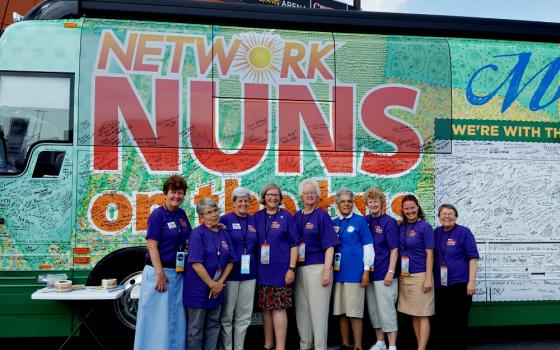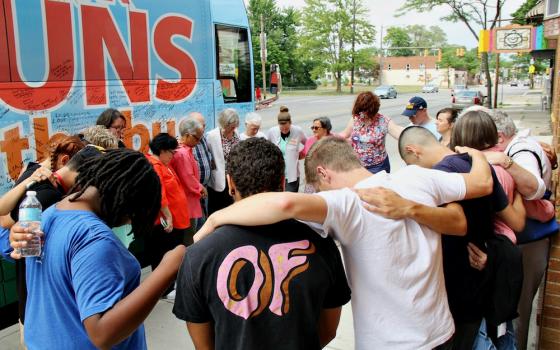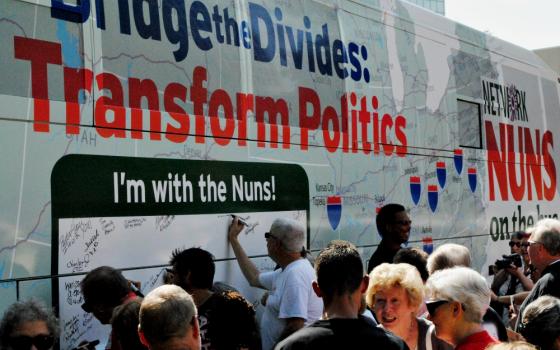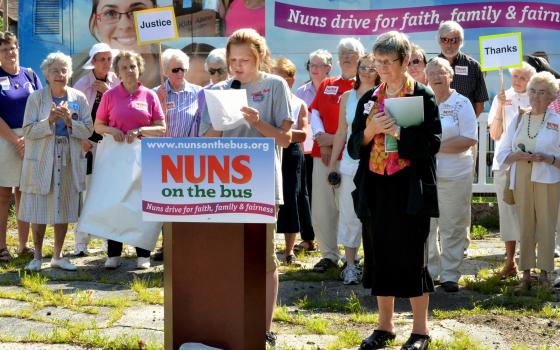The nuns are getting back on the bus.
Network, a Catholic social justice lobby, announced Aug. 20 the advocacy group will hit the road in its popular Nuns on the Bus tour for a sixth time, hosting 54 events in 21 states over the course of 27 days.
This year's tour will begin Oct. 8 in Los Angeles and end Nov. 2 in Palm Beach, Florida, at the Mar-a-Lago resort owned by President Donald Trump, where the sisters plan to present the stories they heard on their cross-country journey.
Social Service Sr. Simone Campbell, Network's executive director, said she's not yet certain what will happen at or near Trump's resort.
"It's still a work in progress, but the idea now is a parade for the common good," Campbell told Global Sisters Report. "We don't know what we're going to do — we've got all kinds of harebrained schemes at this point. But it will probably end with a fiesta for the common good, where we'll have a potluck where everybody contributes."
The Nuns on the Bus tours are a media and fundraising juggernaut, but planning them involves much more than simply renting a bus and rounding up some sisters to ride it.
First, you have to convince Campbell to do another one.
"Actually, I was a little surprised [they talked me into it]," Campbell said, laughing. "I thought the bus was over in '16, and last year, the urgency of staying in D.C. and lobbying was so apparent."
So what convinced her?
"The things I've seen around the country in terms of people's fear and worry about this nation," Campbell said. "They're not understanding this tax policy and how it's going to affect them."
But she thought there might be another way to accomplish Network's goals.
"I tried to say, 'Well, we don't have to do a bus. We can find another platform,' " Campbell said. "Then a colleague said, 'Simone, the bus is the platform. Don't try to reinvent it.' "
Because of the presidential election, the decision to go on the road in 2016 with a focus on mending the growing breach between rich and poor was easy, Campbell said, just as it was easy in 2017 to stay off the bus to fight congressional attempts to repeal the Affordable Care Act and other social safety nets.
The decision wasn't so easy this year, but she said traveling across the country, meeting people and hearing their stories changes her perspective, which is especially important when you work in the bubble of Washington, D.C.
"The biggest existential threat to our democracy is the rampant individualism. Everyone feels they can do it alone," Campbell said. "The bus is about community. It's about 'We the people.' That's really the more important piece for me: the engagement, the sense that we can make a difference together, that I'm not alone."
Daughter of Charity Sr. Mary Ellen Lacy, a Network grassroots mobilization specialist, said nothing can replace the bus trips.
"This will be my fifth bus trip, and you never walk away from it without being transformed," Lacy said. "The community you see and help build — you'd never get that otherwise."
Behind the scenes
Once the decision was made, the work to make it happen began. The first job: raise money.
The Nuns on the Bus tours do bring in donations, Network officials said, but they require a big up-front investment: about $300,000, plus another $100,000 in staff time. In addition to renting the bus, there is fuel to buy, drivers to pay and meals to provide. The sisters try to stay in convents or with other sisters, but staffers stay in hotels. And when congregations don't have money to fly sisters to and from their segments on the tour, Network has to cover that cost, as well.
"It's a lot of money, but it's also an amazing amount of what I call community-building," Campbell said. "We're still raising money [for the trip], but we got big donations up front that were hugely important."
Then a route has to be planned.
"The bus route this year is being structured around when Mar-a-Lago opens [on Oct. 31] and working backward from there," said Meg Olson, Network's grassroots mobilization manager. "We wanted to be coast-to-coast, and we wanted it to be a study in contrasts, so we'll start in the barrios in LA and end up in Mar-a-Lago, which is not just a symbol of individualism and excess; it's the quintessential example of individualism and excess."
And in between? Officials look at congressional districts hotly contested in the midterm elections for opportunities to do on-the-ground lobbying and advocacy as well as cities that are especially suffering because of policies that favor the wealthy and powerful.
"We'll stop at nonprofits or social service agencies and do a quick look around, but it's really about dialogue with the people they serve and hearing from them what's going on," Olson said. "What does it mean if Medicaid is being cut? What does it mean to not have affordable housing?"
Sometimes, she said, the route almost seems to choose itself.
"Some of those congressional districts are in strange areas, like the town of Beaver, Pennsylvania, 40 miles northwest of Pittsburgh," Olson said. "So then it's like, 'We should visit our friends in Erie,' and 'Oh, we definitely want to go to Buffalo.' So some of it is strategic targeting, and some of it is 'Where haven't we been [before]?' "
Once the route is set, events have to be planned, and that's when the work really begins.
"We reach out to every community in terms of site visits, asking who we should talk to," Campbell said. "We have the government relations team pull all the data on an area so we can be specific when we talk about things like unemployment and poverty rates. The communications team works on everything from decorating the bus to building the website. And the development team keeps working with me on the fundraising to make it all happen."
Olson leads a team of three setting up the site visits. It usually works like this, she said: They knew they wanted to stop in Peoria, Illinois, on this trip, so Olson looked at the map and saw Peoria was home to Bradley University. So she called the service-learning director there, who helped her find a social services agency for a site visit. In North Carolina, the Quakers led to a friend at a Catholic church who led to an artist who works with veterans and recently completed an arts project about cuts to veterans' services.
"It's all about relationships," Olson said. "The bus is a huge, creative, joyful tactic that helps Network achieve a lot of its goals. It's a political tactic before the midterm elections. And it's a building tactic: We've brought all these people into the fold via the bus, how do we keep them as friends and supporters of Network?"
Lacy said listening to people's stories feels like part of a sacred trust.
"People want to feel like they're listened to. They want to feel like they matter," Lacy said. "They're finding us as a trustworthy person to tell their stories and not let it die. ... I'm not just listening for the sake of listening. It's to take it back [to Washington, D.C., where Network is headquartered] and use it for better policy."
Maintaining relationships after the bus tour is over is about much more than fundraising, Olson said.
"Network is only as powerful as the people in the field," Olson said. "The people we meet, they're the ones who write the letters and call their legislators."
A monthlong bus trip — this year, there are only two days off so Campbell can attend a nephew's wedding — can be grueling. But Campbell said it's worth it.
"It's so glorious to meet all these people across the country. It's so life-giving," Campbell said. "I find it just sacred. Last year, not having a bus and not traveling as much, I got hungry to be connected with folks who are engaged in their community. It's one thing to give a talk. It's another to receive their knowledge and experience their worries."
Click here to access the full schedule.
[Dan Stockman is national correspondent for Global Sisters Report. His email address is dstockman@ncronline.org. Follow him on Twitter or on Facebook.]





